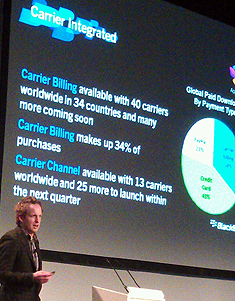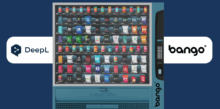RIM on a Roll….
by Sukey Miller

 We took some quiet satisfaction from BlackBerry maker RIM’s news flow at Mobile World Congress this week.
We took some quiet satisfaction from BlackBerry maker RIM’s news flow at Mobile World Congress this week.
The company substantiated the claims it made at its recent DevCon Europe event with a “momentum” release on February 27, stating that there are now 40 carrier partners with whom it has enabled charge to bill payments for the BlackBerry app store.
That’s an impressive achievement and one of those strategies that has no downside whatsoever. It gives customers a simple and secure way to pay, which results in more sales of content for developers and publishers, and consequently more revenue for carriers and RIM. In a week when carrier CEOs have bemoaned the low returns on their data infrastructure investments, the BlackBerry platform is delivering on a strategy that brings meaningful new revenue to carriers from data traffic, a rational demand-led alternative to imposing data taxes on participants in the value chain.
The BlackBerry platform now has more direct carrier billing capability than any other mobile platform. Apple, of course, does not engage at all with carrier billing, and so far there is relatively little activity in either Android Market or Windows Marketplace. Nokia has a lot of connections, but is quite limited by its reliance on PSMS for charge to bill in many cases.
Oh, and the reason we at Bango are quietly satisfied? We deliver all of the direct carrier billing connections for BlackBerry, and we look forward to opening up many more for the BlackBerry platform each month.
![]()
Subscribe to our newsletter
Get the latest subscription bundling news and insights delivered straight to your inbox.



